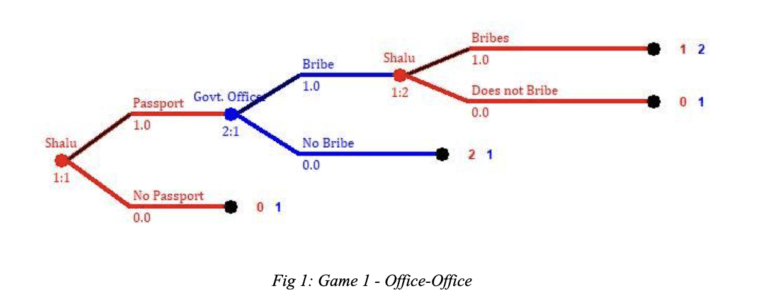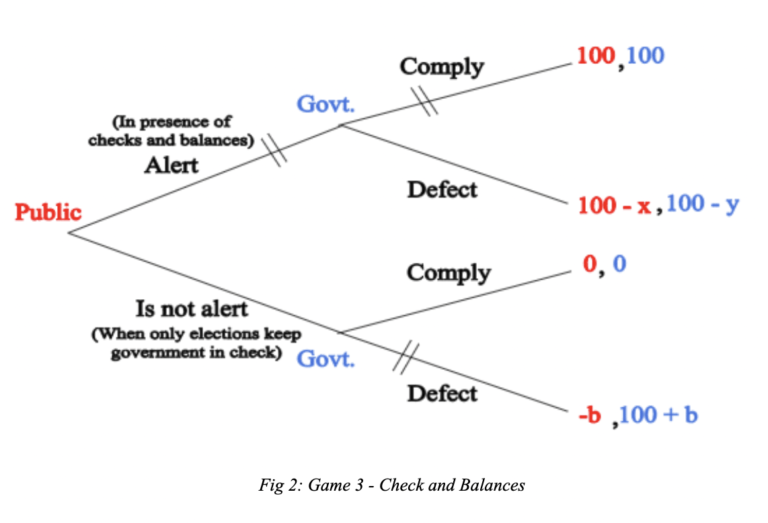“People shouldn’t be afraid of their government. Governments should be afraid of their people.”
― Alan Moore, V for Vendetta
Governments are expected to keep a check on society, ensure law and order is maintained, and maximise the welfare of its citizens. The constitution acts as a toolkit and provides the framework to implement these actions. However, while governments are necessary, the concentration of power in the hands of a few individuals or institutions creates a risk of abuse of power. The Federalist Paper 51 emphasised the need for a system of checks and balances within a government structure to preserve individual liberty and prevent the abuse of power. In a democracy, elections at regular intervals serve as a key mechanism for keeping the government in check by providing citizens with the power to hold elected officials accountable for their actions. Since elections are typically held only once every few years, it leaves a significant amount of time when the government may act in ways that are contrary to the public interest. Additionally, voters may not have access to accurate or sufficient information about the government’s actions and policies, which can limit their ability to make informed decisions at the ballot box. Therefore there must be other provisions in the constitution that serve as a safeguard against tyranny, protect the individual rights of citizens, ensure that the government is accountable to the people and that it operates in the public interest at all times.
Over the years, there have been several issues such as corruption, lack of transparency, inefficiency, and inequality that governments across the world have been grappling with. However, we have used the example of corruption to explain the importance of having proper checks and balances in the system.
The Endless Game of Corruption
Let us start with a simple real-life example, where one has to make a passport. Referring to Figure 1, Shalu wishes to make a passport for which she goes to the Passport Office. The government official can force her to pay a bribe for the work to be done.
Making Sense of Payoffs
Say getting a passport results in a payoff of 2 for Shalu when she does not have to bribe. However, if she has to bribe (say a payoff of 1) her payoff reduces to 1 (2-1).
The government official is drawing a salary and is thus receiving a fixed payoff, say 1. When they get a bribe (say a payoff of 1), their payoff increases to 2 (1+1).
As can be seen in the figure, the Nash Equilibrium of the game is (Passport,Bribes; Bribe), i.e, if Shalu wishes to make a passport, she will pay the bribe when the government official asks for it.

Let us see how the game pans out if Shalu wishes to complain about the government officer for asking for a bribe. (Refer Table 1)
Making Sense of Payoffs
For Shalu, let the cost of taking action be “a”. This cost could be in the form of time or energy expended for making the complaint. Let “p” be the probability with which the bribe seeking officer gets caught and “x” be the satisfaction/value that Shalu derives from it. The government officer is earning a wage, “w” and asks for a bribe, “b”. If the officer gets caught, he/she loses his/her wage. Therefore, the official gets a wage “w” with probability (1-p) in addition to the bribe “b”, when the official asks for the bribe and the consumer can take action.

We desire to make policies such that
- Shalu would take action, when asked for a bribe ⇒ -a+xp> -b
Solving for p ⇒ p > (a-b)/x
If we wish to have a high probability of the bribe seeking officer to get caught, the value of (a-b)/x is to be minimised. Considering “x” and “b” to be constant for simplicity, the cost of complaining, “a” has to be low. This refers to the ease with which one can file a FIR, ask for information under Right to Information (RTI), and approach the judiciary. Local, specialised and fast-track courts contribute to lowering the cost of complaining. Independence of institutions like CBI, Election Commission, Lokayukta and Lokpal are some examples that India has taken in this direction.
- The Officer does not take bribe ⇒ w > (1-p)w+b
Solving for p ⇒ p > b/w
We now wish to minimise b/w by lowering the bribe amount or increasing the wages. Increasing the wages of public officials would encourage them not to indulge in petty bribery and risk their career. (Wydick, 2007).

Let us now take this specific case and look at the larger picture. Referring to Figure 2, “x” is the cost of checks and balances the taxpayers bear, “y” is the fines and the social cost that the government will have to incur if it is found guilty of wrongdoing and “b” is the cost of corrupt behaviour of officials that the public shall incur.
The Nash Equilibrium of the game is (Alert; Comply, Defect). At the first node, if the public in general chooses to be aware and develop institutional methods to keep a check on the government’s power, it can be seen that complying and working for the public welfare is the optimal strategy for the government. However, in a scenario where the public gets excited only at the time of elections, the government shall also play defect and lack accountability to its citizens.
The Need for a Strong and Trustworthy Government
The concept of separation of power and keeping governments in check has its roots in one of Aristotle’s widely acclaimed book ‘Politics’. He states that a constitution must have a government that is diverse in character, consisting of three different branches – the deliberative, public officials and the judiciary. James Madison, one of the American founding fathers, in his paper Federalist 51 wrote that each branch must seek to limit the power of the other two in order to prevent its own. Hence, these pillars of democracy must stand strong and independent of each other to avert erosion of people’s trust in the functioning government.
One of the ways to ensure a system of checks and balances in the parliamentary system is to build a strong opposition. The majority of a single party in lower and upper houses diminishes the role of the legislature and weakens the legislative scrutiny of draft bills/acts in parliament. In India, many controversial decisions by the ruling party, post their landslide victories in two successive general elections from 2014 is popularly attributed to a non-functional opposition. A leader of the opposition plays a vital role in the functioning of parliamentary democracy. They become a part of a committee that is responsible for the appointment of important positions, for instance, the CBI, CVC, CIC and Lokpal to name a few. In addition to this, they are also the Chairman of the Public Accounts Committee playing an integral role in the allocation of funds. Thus, they keep a check on the various actors involved in the government. Since in the 17th Lok Sabha, no party qualified for the said criteria of securing a minimum of 10% of the total seats in the house, there was no Leader of Opposition. The absence of a leader of opposition decreases the strength of checks and balances in the system. Additionally, it decreases the neutrality of other important institutions that are supposed to be the watchdog to the executive. Having a leader of opposition irrespective of the above-specified criteria, is a thought to ponder upon.
The Role of Strong Public Institutions
Additionally, establishing independent and strong public institutions also act as a deterrent for governments to act in self interest. However, the cruel irony is that many of the developing countries in need of social welfare have poor and weak public institutions. Moreover, the executives (president) have a hand in judicial appointments of judges and chief justice. Serious questions have been raised on the integrity of these appointments, raising a popular debate of Collegium vs NJAC. Lack of transparency and corruption are some of the other issues ailing the current system of judiciary in the country.
Furthermore, in order to maintain the institutional system of checks and balances in a pluralistic democracy, mass-member organisations like think tanks or media can fill the gap of keeping excessive power in check. A watchdog as it is called, the media holds the power of transforming a layman into an aware citizen thereby helping them to understand the power of democracy. The genesis and demand of the Right to Information (RTI) Act, 2005 which increases accountability and transparency within the government is attributed to a people’s movement (Mazdoor Kisan Shakti Sangathan) in a small village in Rajasthan.
A Way Forward
It won’t be wrong to say that in a democracy, repeated intervention by any one branch into another’s functioning can undermine people’s faith in the government. It also diminishes the spirit of democracy as too much power gets accumulated in the hands of few. Elections in a democracy are always a time for pomp and show for all political parties. The promises on freebies, announcement of welfare schemes and all other methods to lure voters become rampant. However, one of the most important concerns till date in democracy remains as to how we should make the government accountable for its actions until the next elections. To answer questions like these, James Madison and Alexander Hamilton in their seminal work argued for prevention of accumulated power through a system of regular institutional checks and balances. In the Indian context, over the years multiple ways have been devised to keep a check on the powers of government. However, there is a dire need to strengthen these institutions to increase the faith and trust in our democracy. The role of leader of the opposition in times of absolute majority by one political party must not be undermined. They play an important role in ensuring that key positions at various government institutions are held by independent and competent individuals who can effectively carry out their roles. Most importantly they also play a crucial role in ensuring that the government is held accountable, the opposition is heard, and the parliament functions effectively thereby keeping a check on government’s powers.
Endnotes
-
Payoffs refer to the outcome at the end of a game for a particular player. Players try to choose strategies that will result in the highest possible payoff, taking into account the actions of other players and the potential risks and rewards of different choices.
- Nash equilibrium is a state where no player can improve their payoff by unilaterally changing their strategy.
- Reading payoffs: The payoff for each player is determined by the intersection of the row corresponding to their chosen strategy and the column corresponding to the other player’s chosen strategy.
References
- Federalist papers no. 51 (1788). Bill of Rights Institute. (n.d.). Retrieved March 24, 2023, from https://billofrightsinstitute.org/primary-sources/federalist-no-51
- Wydick, Bruce. (2008). Games in Economic Development. 10.1017/CBO9780511619663.
- Wagner, R. H. (1986). The Theory of Games and the Balance of Power. World Politics, 38(4), 546–576. https://doi.org/10.2307/2010166

